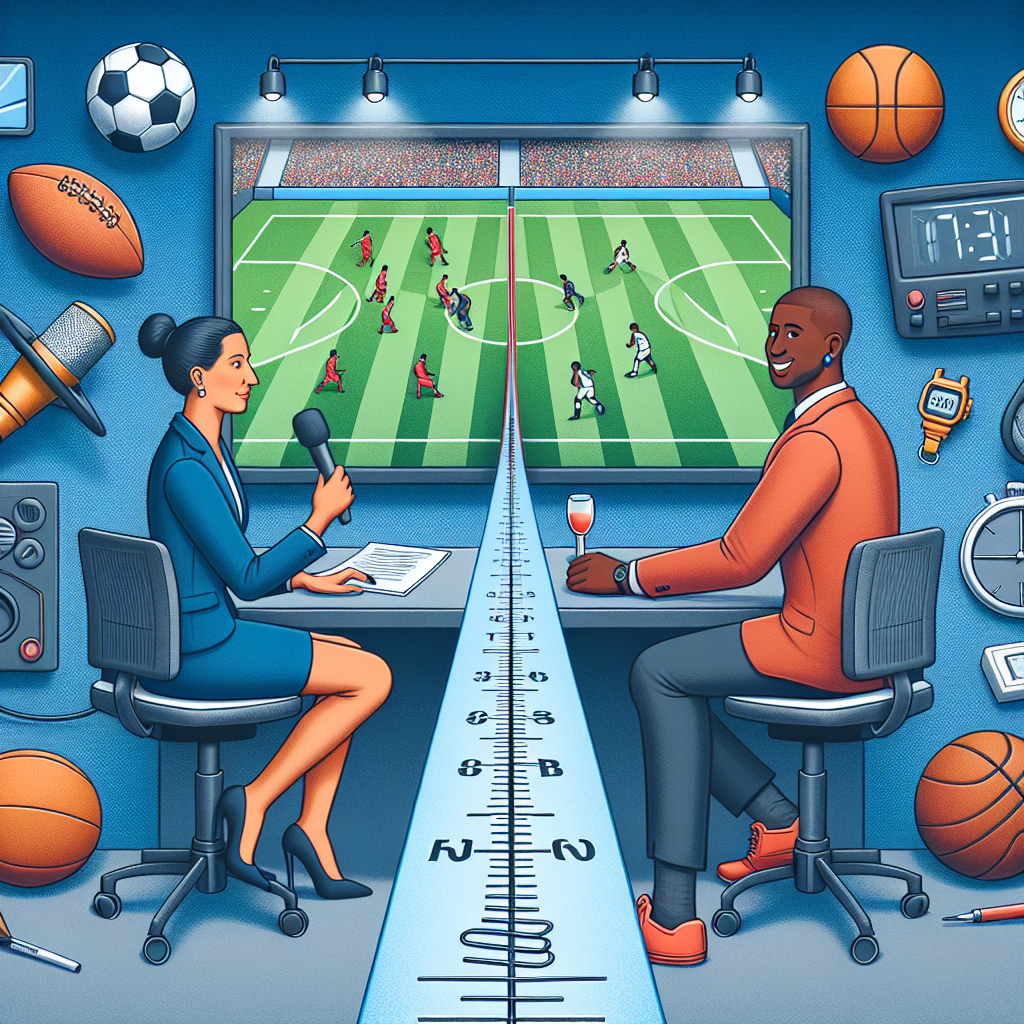Navigating the landscape of sports commentary can be a challenging endeavor. As fans turn to various platforms for real-time game analysis, the line between bias and objectivity becomes increasingly blurry. Understanding how commentators navigate this fine line is essential for fans who desire informed opinions that enrich their viewing experience. This article explores the critical aspects of bias and objectivity in sports commentary and provides insights into their impact on audience perception and engagement.
The Importance of Objectivity in Sports Commentary
Objectivity in sports commentary serves as a cornerstone for fostering trust between commentators and their audience. Objective commentary allows fans to form their opinions based on fair and balanced assessments rather than being influenced solely by the commentator’s personal biases. In 2025, as technology transforms how fans consume sports content—through platforms like augmented reality and immersive live streaming—objectivity remains paramount. Audiences can easily access multiple viewpoints and analyses, which heightens the demand for impartial commentary that delivers a comprehensive understanding of the game.
Moreover, the expectation for objectivity in sports commentary has grown alongside the increasing sophistication of viewers. Fans today are not just passive consumers; they engage in discussions on social media, contribute to fan forums, and even participate in live chats during games. This transition demands that commentators provide insights rooted in facts and analysis. An objective approach not only enhances the credibility of the commentating team but also enriches the overall sports experience. Whether it’s analyzing game strategies, player performances, or coaching decisions, an objective lens allows commentators to contribute meaningfully to the conversation.
Understanding Bias in Sports Commentary
Bias in sports commentary can take many forms, from subtle inclinations towards a favorite team or player to overt favoritism during live broadcasts. Sports commentators might develop biases based on their individual backgrounds, personal experiences, or established relationships within the industry. In 2025, while the rise of data analytics aims to support factual reporting, personal biases still slip through, influencing commentary in significant ways. Research reveals that biased commentary can sway audience sentiment, often leading to polarized fan bases and heightened rivalries.
Furthermore, bias can also manifest through the lens of corporate sponsorships and affiliations. In an era where sports networks have increasingly aligned themselves with specific teams or leagues, the potential for biased commentary grows. Commentators may feel compelled to downplay negative aspects of a sponsored team while emphasizing its strengths. This complicity can dilute the objectivity that audiences crave, often leaving viewers disillusioned. To navigate the crowded field of sports commentary effectively, commentators must recognize and address their biases, ensuring transparency and fairness in their analyses while mitigating the risks associated with corporate influences.
The Role of Technology in Shaping Commentary Bias
In 2025, technology plays a crucial role in the dynamics of sports commentary. With real-time analytics, advanced graphics, and instant replay technology, commentators are now equipped to provide detailed insights on demand. However, the same technology that enhances objectivity can also amplify bias. Commentators may cherry-pick statistics or graphics to back up their claims, creating an illusion of objectivity while actually reinforcing their biases. For example, a commentator might emphasize a player’s scoring record while downplaying their defensive shortcomings, skewing audience perception in favor of a particular narrative.
Moreover, the shift toward social media as a primary source of sports commentary has introduced new dimensions of bias. Influential figures can easily sway public opinion through platforms like Twitter and Instagram. This democratization of commentary allows for diverse perspectives, but it also creates an environment that can magnify biased opinions. The instant nature of social media means that commentators are often pressured to react quickly, sometimes sacrificing depth and objectivity for the sake of immediacy. As fans increasingly engage in these platforms, the line between credible analysis and biased opinions blurs even further, underscoring the challenges faced by both commentators and viewers.
Lastly, the impact of artificial intelligence (AI) cannot be overlooked. AI-driven algorithms can analyze vast amounts of data to predict outcomes and suggest storylines. While this can lead to more objective analyses based on statistical trends, there is also the potential for bias to be embedded in these algorithms. If the data sets used to train AI reflect existing biases—whether from historical performance data or spectator sentiment—the commentary derived from such analyses risks perpetuating those biases. Commentators relying on AI tools must be aware of these pitfalls and actively work to ensure that their insights maintain the integrity of objectivity.
Engaging Audiences: The Balance Between Bias and Objectivity
Finding the right balance between bias and objectivity is essential for engaging audiences effectively. In 2025, as fan expectations evolve, commentators must leverage their personalities while delivering facts and analysis. Personal anecdotes and passionate opinions add flair to commentary, making it relatable and entertaining. However, it’s crucial that such expressions do not cloud the core analysis. A commentator’s personal connection to a team can enrich their insights, but it’s important to maintain a commitment to fairness—especially during critical moments in the game.
Moreover, successful commentators often succeed in striking this balance by leaning into the spirit of the game, where passion and enthusiasm support their objective analyses. For instance, discussing a controversial referee call, a commentator could provide their viewpoint while contextualizing the incident through rule interpretation and historical precedents. This combination of personal engagement and factual insights is critical for building rapport with fans while ensuring clarity and objectivity in commentary.
As a result, the commentary landscape will continue to evolve as dynamics shift. The future will likely see commentators who are adept at embracing both their biases and objectivity, using their platforms not just to share opinions but to cultivate discussions that reflect the multifaceted nature of sports. Engaging multiple viewpoints and encouraging healthy debates will be essential in maintaining the interest and loyalty of today’s audiences.
Future Trends in Sports Commentary: Towards Greater Objectivity
Looking ahead, we can anticipate significant trends that will promote greater objectivity in sports commentary. The advent of virtual reality (VR) and enhanced viewing experiences will create immersive environments where fans can engage with multiple perspectives during live games. This technology could enable viewers to switch between commentary styles or choose to listen to a variety of analysts while viewing the same play from different angles. Such innovations could encourage unbiased analysis by allowing fans to discern subjective opinions from objective facts, broadening their understandings of the game.
Additionally, continuous scrutiny from audiences and increasingly sophisticated platforms will lead to greater accountability for sports commentators. In 2025, as more fans utilize technology to fact-check commentary in real time, transparency will become even more crucial. Commentators may need to cite their sources, disclose potential biases, and engage with fans in discussions that promote a deeper understanding of gameplay and strategies. This accountability will serve as a check against undue bias and assist in creating a culture of responsible commentary.
Finally, as the role of diversity in sports commentary gains recognition, there will be an increasing push for more varied voices that reflect a broader spectrum of fans. Hiring practices focused on diversity will bring in commentators from different backgrounds, helping reduce biases stemming from a singular perspective. This inclusion not only fosters a richer dialogue around sports but also enhances authenticity, as commentators navigate their unique experiences while providing fair assessments of teams and players.
Conclusion
The conversation around bias versus objectivity in sports commentary is as relevant in 2025 as in previous years, reflecting changes in technology, audience engagement, and the evolving expectations of fans. Understanding the importance of objectivity helps build trust, while navigating bias requires self-awareness and transparency. Sports commentators play a vital role in shaping the narrative surrounding games, and striking the right balance between personal passion and factual analysis remains essential.
As the industry continues to innovate, the future of sports commentary looks promising, with opportunities for greater audience engagement and more diverse perspectives. Ultimately, by remaining conscious of biases and prioritizing objectivity, commentators can enrich the sports experience for fans while fostering an environment that values informed discussion and critical thinking.
FAQs
What is the difference between bias and objectivity in sports commentary?
Bias refers to a personal inclination or favoritism towards a team or player, which can skew commentary. Objectivity focuses on presenting facts and fair assessments without personal influence, allowing fans to form their opinions.
Why is objectivity important in sports commentary?
Objectivity is crucial for building trust with the audience, promoting fair dialogue, and enhancing the overall sports experience. It allows fans to engage with diverse perspectives and make informed judgments about the game.
How can technology affect bias in sports commentary?
Technology can both enhance objectivity by providing real-time analytics and facts, but it can also amplify bias if commentators selectively utilize data to support specific narratives, monitoring their use of technology is essential.
What trends do we see shaping the future of sports commentary?
Trends such as virtual reality experiences, increased accountability through audience engagement, and diversity in commentator voices will shape the future of sports commentary, promoting greater objectivity overall.
How can commentators maintain impartiality while expressing opinions?
Commentators can express their opinions by providing context and evidence to back their claims. They should also recognize their biases and ensure that their personal views do not overshadow factual analysis.






